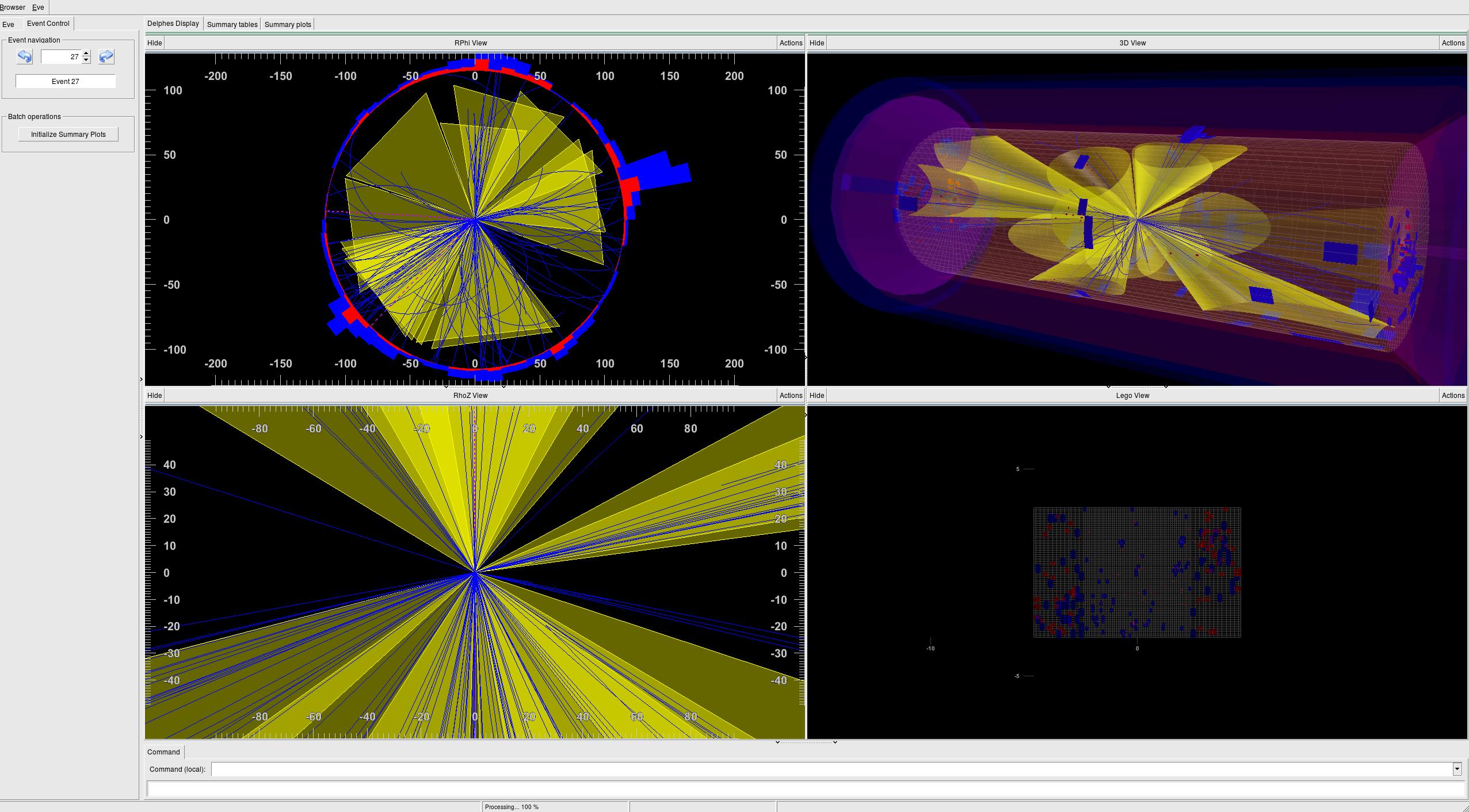Generation of simulated high energy collisions data using MadGraph (hard scattering), Pythia (showering) and Delphes (detector fast simulation). This requires to have ROOT installed.
Note: MG v2.6.7 is used to exploit a plugin implementing initial state radiations, which is not released in MG today (02/21). This plugin doesn't work with current latest version v2.9.2.
Note: the file
setup.shmust be adapted to your setup to have a ROOT version compatible with Delphes.
- Download MadGraph and untar the archive as
MG5_aMC/:
wget https://launchpad.net/mg5amcnlo/2.0/2.6.x/+download/MG5_aMC_v2.6.7.tar.gz
tar -xvzf MG5_aMC_v2.6.7.tar.gz
mv MG5_aMC_v2_6_7/ MG5_aMC
In order to have the initial state radiations accounted for electrons-positrons collisions, one need to download this plugin
MGISR and put it in MG5_aMC/PLUGIN. Enabling ee ISR is then done through the python interface,
described below, at the level of mg.run_proc_dir() function (creating the process directory).
- Install needed modules: Pythia and Delphes
cd MG5_aMC/
./bin/mg5_aMC
install pythia8
install Delphes
Note: the Delphes compilation might fail if the installed ROOT version is not compatible. In that case, a compatible version of ROOT must be installed and Delphes can be compiled by hand, doing:
cd Delphes ./configure make
- Compile the display library of Delphes and produce
libDelphesDisplay.so, to enable event display.
cd Delphes
./configure
make display
- Data analysis and event display: link/load the required libraries
cd analysis
ln -s ../MG5_aMC/Delphes/libDelphesDisplay.so .
The workflow consists in first generating the process setup (directory) with MadGraph using a "process card". Then, the showering of events is performed with Pythia and the detector simulation is ran with Delphes. A ROOT file is then produced which contains different collections of objects. This ROOT file can be used to get event display or directly distributions.
A python interface is designed to ease the event generation, based
on the MadGraph syntax. An example is featuring how to
generate p p -> t tbar and mu mu -> t tbar using this python interface. There are two
classes, but the first one is not mandatory:
collision: initial state (particle, energy, polarization, pdf) and final state, currently only supporting the syntaxxx > yypossibly with specified decays(y > zz, y > zz)madgraph: running the actual event generation with several options such as pythia or delphes.
In a nutshell: generate e+e- collision with polarized beams
import generation_handler as gen
# Define collision setup
ee = gen.collision('e+ e-', 't t~', ebeam1='180', ebeam2='180', polbeam1='1', polbeam1='0')
# Get a MadGraph instance
mg = gen.madgraph('../MG5_aMC')
# Generate events, with the proper beam parameters (energy and polarization)
mg.run_proc_dir(proc=ee.mg_proc(), directory='ee_ttbar', eeISR=True)
mg.gen_evts(directory='ee_ttbar', run='run01', params=ee.beam_params())Several options are possible using LHE parsers. For low number of events, typically o(10000), one can use this python parser hosted by the scikit-hep project, but for larger samples one can use a go parser hosted by the go-hep project (an example for ttbar -> dilepton final state can be found in this repository, where the executable lhe2root can be ran out-of-the-box for this final state).
There are two options: the first one is to simply create a code skeleton using
root delphes_events.root
root[0] Delphes->MakeClass()
The second option, a bit less code-verbose, is to use classes provided by Delphes
which are automatically loaded if you use this rootlogon.C.
An example of such analysis code can be found here.
root -l rootlogon.C
root[0] .x EventDisplay.C("../MG5_aMC/Delphes/cards/delphes_card_ATLAS.tcl", "delphes_events.root")
